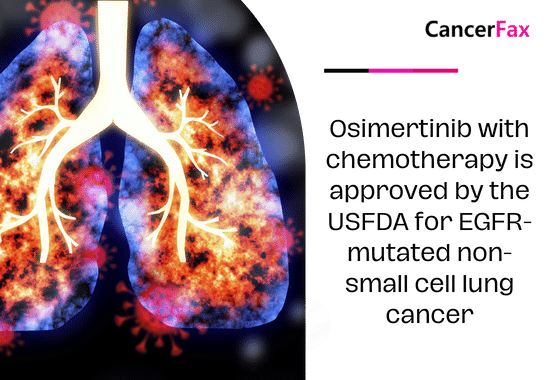
The Food and Drug Administration approved osimertinib (Tagrisso, AstraZeneca Pharmaceuticals LP) in combination with platinum-based chemotherapy for patients with locally advanced or metastatic non-small cell lung cancer (la/mNSCLC) who have tumors with EGFR exon 19 deletions or exon 21 L858R mutations, as identified by an FDA-approved test, on February 16, 2024. The effectiveness was assessed […]
The Food and Drug Administration approved osimertinib (Tagrisso, AstraZeneca Pharmaceuticals LP) in combination with platinum-based chemotherapy for patients with locally advanced or metastatic non-small cell lung cancer (la/mNSCLC) who have tumors with EGFR exon 19 deletions or exon 21 L858R mutations, as identified by an FDA-approved test, on February 16, 2024.
The effectiveness was assessed in FLAURA 2 (NCT04035486), an open-label, randomized trial involving 557 patients with EGFR exon 19 deletion or exon 21 L858R mutation-positive locally advanced or metastatic non-small cell lung cancer (NSCLC) who had not had any previous systemic treatment for advanced illness. Patients were randomly assigned in a 1:1 ratio to receive either osimertinib plus platinum-based chemotherapy or osimertinib alone.
The primary efficacy measure was progression-free survival (PFS), evaluated by the investigator, with overall survival (OS) as a significant secondary measure. Osimertinib combined with platinum-based chemotherapy showed a substantial increase in progression-free survival (PFS) compared to osimertinib alone, with a hazard ratio of 0.62 (95% CI: 0.49, 0.79; two-sided p-value<0.0001). The median progression-free survival (PFS) was 25.5 months with a 95% confidence interval (CI) of 24.7 to not estimable (NE) in one arm, and 16.7 months with a 95% CI of 14.1 to 21.3 in the other arm. Although the overall survival statistics were not fully developed at the current analysis, with just 45% of the pre-specified fatalities reported for the final analysis, there was no indication of a negative trend. Common side effects (≥ 20% occurrence) in patients treated with osimertinib in combination with platinum-based chemotherapy included leukopenia, thrombocytopenia, neutropenia, lymphopenia, rash, diarrhea, stomatitis, nail damage, dry skin, and elevated blood creatinine levels. The suggested osimertinib dosage is 80 mg taken orally once a day, with or without food, until disease progression or unacceptable toxicity. Consult the prescribing information for pemetrexed with cisplatin or carboplatin for the specific dose details.